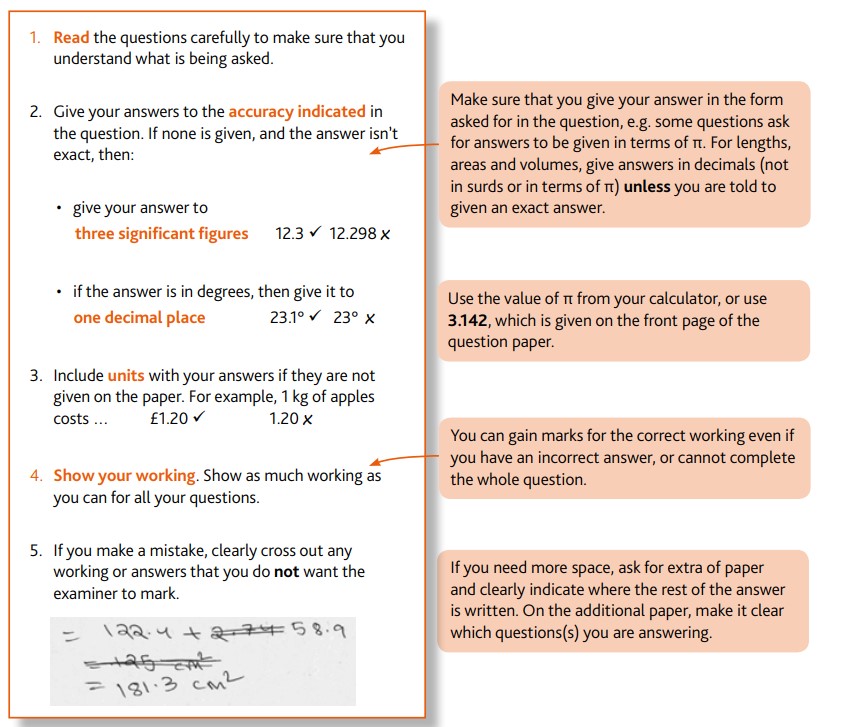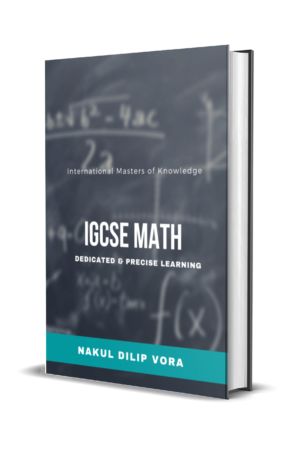How to Prepare For the IGCSE Paper Mathematics

This blog is about How you need to prepare for your upcoming IGCSE Paper or your school’s topical or Mock exams. Curated with years of experience and with the help of Cambridge guidelines.
We would summarise the whole discussion as follows, you can click to go to that section directly.
1. IGCSE Paper structures Mathematics
Core: Paper 1 (Short-answer questions) and Paper 3 (Structured questions)
You need to answer all questions on each paper
Extended: Paper 2 (Short–answer questions) and Paper 4 (Structured questions)
You need to answer all questions on both papers.
- (Short-answer questions): These are usually worth 1–3 marks each. Some might be broken up into two parts
- (Structured questions): Each question is split into many parts, with each part usually being worth 1–4 marks. Here, for example, a question is split into subparts a,b,c,d,e. Often the answers to later parts will depend on the answers to earlier parts.
2. General advice for all IGCSE Paper

Assessment of the following criteria

3. Command words in IGCSE 0580 Paper
A command word is the part of the question that tells you what you need to do with your knowledge. For example, you might need to describe something, explain something, argue a point of view or list what you know. The table below includes command words used in the assessment for this syllabus. The use of the command word(s) within a question will relate to the context.
| Command Word | What it means in an IGCSE Paper |
|---|---|
| Keyword | |
| Calculate | work out from given facts, figures or information, generally using a calculator |
| Construct | make an accurate drawing |
| Determine | establish with certainty |
| Plot | mark point(s) on a graph |
| Describe | state the points of a topic/give characteristics and main features |
| Explain | set out purposes or reasons/ make the relationships between things evident/ provide why and/or how and support with relevant evidence Give produce an answer from a given source or recall/memory |
| Show (that) | provide structured evidence that leads to a given result |
| Sketch | make a simple freehand drawing showing the key features |
| Work out | calculate from given facts, figures or information with or without the use of a calculator |
| Write | give an answer in a specific form |
| Write down | give an answer without significant working |
4. How the answer can be improved
- It is always a good idea to check that your answer seems sensible before you move on to another question.
- You should only ever round the final answer, do not round intermediate values. If you can, store the intermediate values in your calculator so that you can use the full value in your calculations. If you’re not able to do this, and you have to round the intermediate values, do not round them to less than three significant figures
- In a ‘show that’ question, show all the steps in the method. It’s important to show all steps, even if they seem obvious.
- When working with time, answers are accepted in either 24 clock or 12 clock time but if you give your answer in the 12 hour clock then it must include am or pm as well.
5. Common mistake in IGCSE 0580 Paper
- Inaccuracy of answers
- Using incorrect terminology
- Incorrect Formula
- Using Blunt Pencil for Diagrams
- Not mentioning Relevant units in final answers
- Not rechecking Answers after completing the paper
- Inefficient working for 3-4 Marks questions
- Wasting too much time on a tricky question instead of focusing on completing all other easier questions in the paper
- Not mentioning Scale in graphs
6. General advice to avoid Mistakes in IGCSE 0580 Paper
In order to do your best when answering a mathematics question, make sure you:
- revise all of the topics for the syllabus you are studying before the exam
- understand what all the key terms and command words in the question mean
- read the questions carefully and consider what you need to do before you do it
- only round the final answer, not intermediate values
- show all steps in your working, and show them clearly
- round to the correct degree of accuracy
- use the correct mathematical terminology
- check your answers seem reasonable given the context or details of the question.
7. Before the examination IGCSE 0580 Paper
- Find out when the examinations are and plan your revision so you have time to revise. Create a revision
- timetable and divide it into sections to cover each topic.
- Spend most of your time focussing on specific skills, knowledge or issues that you have found more difficult
- when practicing them either during revision or earlier in the course.
- Write a summary of all the key information for a topic – use the checklists at the end of this section.
- Know the meaning of the command words used in questions and how to apply them to the information given.
- Look at past examination papers and highlight the command words and check what they mean.
- Make revision notes and work on practice questions. Reading alone does not work, you need to be active and practice your maths.
- Work for shorter periods then have a break. Revise small sections of the syllabus at a time but do this regularly.
Testing Tips
- Test yourself by trying out some past exam questions. Use the mark schemes to assess yourself and to be familiar with how marks are awarded for different questions.
- Be organized in advance with your notes, texts, exercise books, revision guides, and revision websites so you do not waste valuable revision time trying to find things.
- Make notes of key mathematical words that you should use in questions that ask you to ‘describe’ or give ‘geometrical reasons for’, e.g. in describing transformations or giving reasons in circle theorem questions.
- Look at the mark schemes for these types of questions from past papers to see how marks are awarded.
- Make sure you have all of the correct mathematical equipment ready for the exam, particularly your calculator. Make sure you are familiar with all of the important functions on your calculator.
- Practice the areas you can do well not just those that you find more difficult
- Take breaks and do things to relax when you take your breaks, this will help you to be more productive when you are revising
8. During the examination IGCSE 0580 Paper
- Plan your time according to the marks for each question. For example, a question worth one mark requires less time than a question worth 4 marks. If a question has several parts, then the parts with more marks will need more time.
- Read each question very carefully.
- Identify the command words – you could underline or highlight them.
- Identify the other keywords and information and perhaps underline them too particularly where questions require reasoning or problem solving.
- Read the questions carefully and make sure you have answered the question that is being asked.
- Show your working; this is particularly important for questions where you are asked to ‘show that …’.
- Set your working out clearly so that it is easy to follow, this makes it easier to keep track of what you have done and makes checking back through your work easier, and it makes it easier for the examiner to mark your work; try to write it in a logical order in the answer space.
Writing Tips
- Write answers clearly; if you want to change an answer then you should cross the answer out and write a replacement; if your answer is on the answer line, cross it out and write the replacement answer above it, Do not try to change numbers on the answer line as this can lead to unclear figures.
- Check your work and answers to avoid errors.
- Give your answer to the appropriate level of accuracy; either the accuracy indicated in the question or the accuracy given on the front of the paper.
- Avoid rounding intermediate values part way through your calculation; only round the final answer.
- Check that the answer that you have given is sensible and realistic for what is being asked.
- Use a pencil when drawing diagrams or completing graphs; this means that you can change your answer more easily if you have made a mistake.
- Take care when reading scales.
- If you are asked for reasons for your answer then use the correct mathematical terms.
- Use the mark allocation given with the questions/parts of questions to try to judge how much work is needed to answer each part.
Hope you score well in your Examination, stay tuned for more.
-
IGCSE Biology Past Papers Booklet Set
₹11,999.00 -
IGCSE Chemistry Past Papers Booklet Set
₹11,999.00 -
IGCSE Mathematics Past Papers Booklet Set
₹9,999.00 -
IGCSE Physics Past Papers Booklet Set
₹11,999.00 -
Physics AS & A2 Level Past Papers Booklet Set
₹14,999.00






One Response
[…] Click here to know our strategies on how to prepare for Mathematics Paper […]